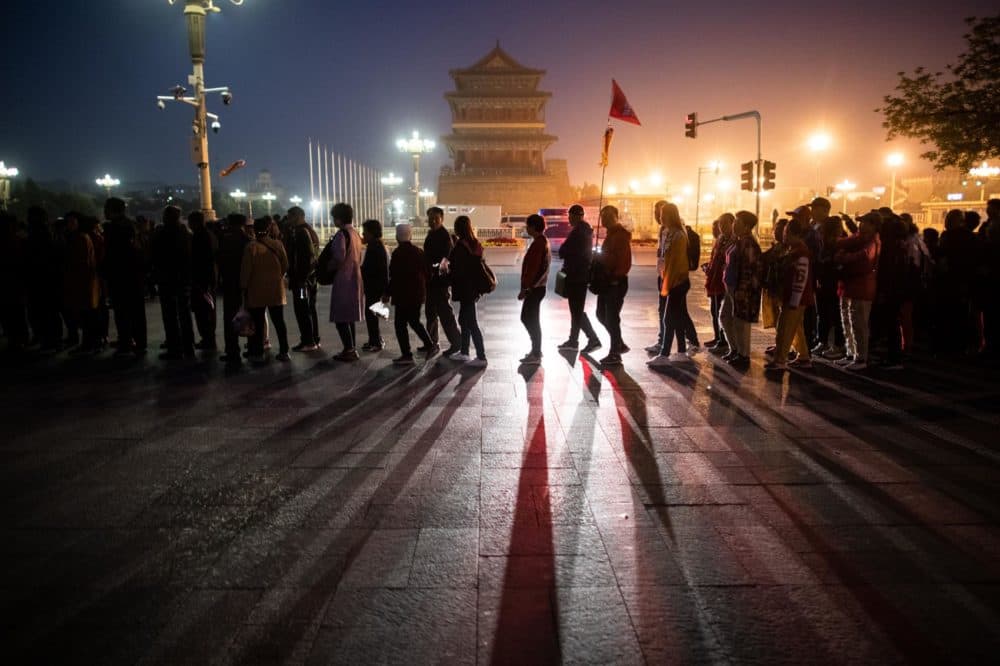Advertisement
30 Years Since Tiananmen Square Changed China As We Know It
Resume
Find the web buildout for this hour — featuring a partial transcription — here.
With Meghna Chakrabarti
Tiananmen Square, 30 years after the crackdown. We remember the day that changed modern China.
Guests
Zhou Fengsuo, one of the 21 student leaders of the 1989 protests in Tiananmen Square whose arrest was ordered by the Beijing Public Security Bureau. Arrested June 13, 1989, and imprisoned for a year, then moved to the United States in 1995. President of the human rights charity Humanitarian China, which he co-founded in 2007. (@ZhouFengSuo)
Mary Gallagher, professor of political science and director of the Center for Chinese Studies at the University of Michigan. (@MaryGao)
Yaqiu Wang, China researcher at Human Rights Watch who divides her time between Hong Kong and New York. (@Yaqiu)
From The Reading List
NPR: "30 Years After Tiananmen Protests, 'The Fight Is Still Going On For China'" — "Zhou Fengsuo was a top university student when the first protests broke out in the heart of the ancient imperial city of Beijing, set off by the death of reformist leader Hu Yaobang in April 1989.
"But he threw caution to the wind as students marched to Tiananmen Square before Hu's funeral. Tens of thousands of students like him from across the country, professors, blue-collar workers and passersby joined in the following months. Often dubbed the 'student democracy protests,' those who assembled in Beijing and elsewhere across China didn't just want democratic reform. Among other things, they demanded labor bargaining for workers, a free press and an end to party corruption.
"But by May, officials who were sympathetic to the student protesters lost out to factions led by Deng Xiaoping, the Chinese leader who ordered that the demonstrations be put down. On the night of June 4, tanks rolled in to the square and began shooting. Violent crackdowns in other Chinese cities followed in the next few days. No authoritative death toll exists, but historians estimate it to be in the hundreds to as high as 10,000."
Human Rights Watch: "Human Rights Activism in Post-Tiananmen China" — "In the three decades since the Tiananmen Massacre, the Chinese government's killing of an untold number of peaceful pro-democracy demonstrators around June 4, 1989, human rights activists in China have made tremendous sacrifices in the pursuit of a more just and free country.
"Many have been arbitrarily detained, imprisoned, or forcibly disappeared. Some died while in state custody. Some live with permanent physical ailments and mental trauma as a result of torture by the authorities. Some, after suffering years of unrelenting harassment, fled China.
"Chinese Communist Party (CCP) leaders saw the protests at Beijing’s Tiananmen Square and across major cities in the spring of 1989 as an existential threat to their rule. One lesson the CCP took away from the event was to nip any independent activism and peaceful criticism in the bud.
"For the past 30 years, Human Rights Watch has continually documented the Chinese government’s repression of activists. We covered in detail the arrests and trials of Tiananmen participants; released a report jointly with the nongovernmental organization Human Rights in China that revealed the names of 522 Tiananmen prisoners that few had known existed; and published multiple interviews with protest participants. Human Rights Watch also consistently called for the Chinese government to address the human rights violations related to the crackdown and hold those officials legally accountable for the killings.
"Human Rights Watch marks this somber 30th anniversary of the Tiananmen Massacre by honoring those across the years who have struggled to stand up to power and advance the rule of law, freedom of expression, and religious freedom in China."
Quartz: "The lives of Tiananmen’s most wanted, 30 years on" — "Barely 10 days after army tanks rolled onto Tiananmen Square and crushed the student protest movement there on June 4, 1989, the Beijing Public Security Bureau issued a most-wanted list of 21 student leaders.
"For weeks, students had gathered at the sprawling public plaza in the heart of Beijing to demand democracy, government accountability, and civil liberties like the freedom of press and speech. As many as 1 million people occupied the square, making it one of the largest protests in modern Chinese history.
"Then on June 4, 1989, Chinese troops entered the square and fired on civilians. As many as 10,000 were killed, according to a secret diplomatic cable sent at the time.
"The majority of activists on that most-wanted list now live in the US, according to information compiled by Human Rights in China, a non-governmental organization with offices in New York and Hong Kong that promotes fundamental rights and freedoms in China."
Brian Hardzinski produced this hour for broadcast.
This program aired on June 5, 2019.